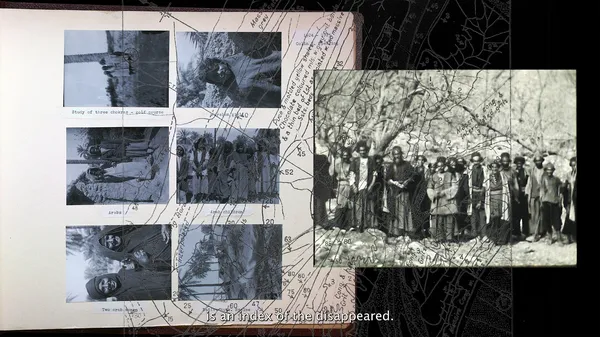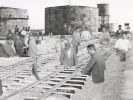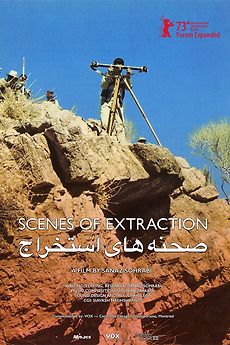Eye For Film >> Movies >> Scenes Of Extraction (2023) Film Review
Scenes Of Extraction
Reviewed by: Jennie Kermode

To be at the sharp end of colonialism is to experience a process of extraction, “to be dispossessed of land, of history, of flesh.” During the first half of the 20th Century, British interests set about extracting as much wealth as possible from the oil fields of Iran, under the guise of helping the country to enter the modern world. The process of rapid industrialisation which accompanied this permanently reshaped the country’s economy and wreaked havoc with its culture and traditional institutions as it did so, exploiting a series of political puppets and ultimately paving the way for the revolution which would see power fall into the hands of the Ayatollahs. Sanaz Sohrabi’s experimental documentary, which screened as part of the 2024 Glasgow Film Festival, charts this process using a series of film clips, photographs and charts from the British Petroleum Archives.
It’s a film made of layers, sometimes literally, as the skin of the country’s mountains is peeled away to reveal the results of a geological survey. The surveyors were looking for places where the oil might have pooled underground, with, naturally, little regard for the people already using the land. To reach such deposits, they needed infrastructure. A promotional film observes the construction of the northern part of the trans-Iranian railway, flying the flag, allowing the government to boast of the success of its partnership, the rapid industrialisation – but, as Sohrabi points out, a lot of interesting things are happening on the sidelines.

Such details are everywhere here. The tents in which workers lived, relocating their entire families, often to hostile and poorly supplied terrain. The migrants drafted in from across the empire, according to its strict racial hierarchy: Burmese labourers to do the worst jobs, Indian surveyors. An obvious lack of any kind of health or safety consideration. Scraps of individual stories emerge, and we hear about individuals who had, or lost, various forms of power, but the film’s main interest is in those background figures with just a few grey smudges on a faded negative to show that they were ever there at all. Witnessing them in their masses, we are invited to imagine their experiences and to reflect on the particular psychological impacts of being caught up in something on this scale.
Sohrabi is digging through the archive, she says, in an attempt to unearth the social experiences of extraction. She builds collages of imagery, sometimes deliberately overwhelming viewers, at other times slowing right down to encourage us to ponder what we might previously have overlooked. It’s a reflexive, even self-conscious work, interested in the infrastructure of oil, of film. It bores down into its subject but is never boring. Although the narration is studiously unemotional, anyone with a personal connection to the region, or a modicum of empathy, will appreciate the existential horror of it, along with the romance of the dream to which many of the smiling Iranian engineers in the film clips believe they have committed themselves.
The full story of how oil extraction shaped Iran is yet to be told, but this is a valuable contribution to the record, and a warning to those small countries which may, as markets shift, find themselves unexpectedly possessed of great natural wealth in times to come.
Reviewed on: 01 Apr 2024

















